IMDEA Networks

Archivos: Events
Technique for Indoor Position Location of Wireless LAN Clients
If you would like more information about James Aweya, please visit his homepage.
Seguir leyendo arrow_right_alt“Research Trends in Future Internet”, Telefonica Open Research Day 2008
Telefonica Open Research Day 2008
Research is the process of exploration of new ideas and allows Telefonica to look into the future, working on tomorrow's problems and finding solutions that people can only dream about today.
As a result Telefonica is investing in bringing together incredibly passionate talented people with different view points (nationalities, disciplines, backgrounds) to follow their dreams, create new subjects and as a result new worlds for Telefonica's customers.
Seguir leyendo arrow_right_altOn Security and Quality of Service in Multihop Wireless Networks
On Security and Quality of Service in Multihop Wireless Networks Mobile Ad hoc Networks, Wireless Mesh Networks and Wireless Sensor Networks have attracted remarkable attention in the research community in recent years. Fashioned from whatever devices are immediately available, the self-organizing nature of these networks promises spontaneous, untethered communication in absence of infrastructure, or the organic growth of wireless meshed networks. However, the fact that ad hoc and mesh networks are not yetdeployed at large indicates that they are not ready for prime time. This talk discusses selected issues in the area of quality of service and security for multihop wireless networks. We start with an overview on the work carried out at the Mobile Networking & Ubiquitous Communications group at Technische Universität Darmstadt, Germany.
Seguir leyendo arrow_right_altTrilogy Project
Ponente: Asistencia restringida a miembros del proyecto.
Más información sobre Trilogy Project
IMDEA Networks Board of Trustees
Nota: Asistencia reservada en exclusiva a miembros
Please note: Attendance restricted to members only
The meeting will be conducted in English
Seguir leyendo arrow_right_altKey Issues of Peer-to-Peer Mechanisms as Future Internet Communications
Ralf Steinmetz is one of the world experts in multimedia and P2P applications, is the author of one of the most referenced books in the area, and he has received the ACM Multimedia Award.
Since early 1996 Ralf Steinmetz has been a professor at the dept. of Electrical Engineering and Information Technology as well as at the dept. of Computer Science of the Darmstadt University of Technology, Germany. There he is in charge of a chair position as managing director of the "Multimedia Communications Lab". From late 1996 until late 2001 he directed the GMD/Fraunhofer Integrated Publications and Information Institute. In 1999 he founded the Hessian Telemedia Technology Competence Center (httc e.V.). On whose board he has since served as chair. He is also one of the directors of the Information Transfer Office at the university. From 2002 to 2004 as dean he managed the department.
Seguir leyendo arrow_right_altDelay Tolerant Bulk Data Transfers on the Internet or how to book some terabytes on "red-eye" bandwidth
Many emerging scientific and industrial applications require transferring multiple terabytes of data on a daily basis. Examples include pushing scientific datasets from particle accelerators/colliders to laboratories around the world, synchronizing data centers in different continents, and replicating collections of high definition videos from Olympic Games, taking Location on a different time-zone. A convenient property of all above applications is their ability to tolerate delivery delays from a few hours to a few days. Such Delay-Tolerant Bulk (DTB) transfers are currently being serviced through the postal system using hard drives and DVDs, or through expensive dedicated networks.
Seguir leyendo arrow_right_altDistributed and Collaborative Hapto-Virtual Environments and Applications: Effects of Networking Impairments on Quality of Experience
Multimedia Communications, involving traditional media such as audio, video, text, 2D graphics, have become parts of everyday e-life. New digitalmedia, such as Virtual Reality and Haptics, have now added new dimensions to multimedia tele-collaboration. This presentation will introduce basic issues on Distributed and Collaborative Virtual Environments, where the feeling of touch (haptics) and its transmission over networks is becoming essential. Various applications will be described ranging from industrial training to e-commerce to medical education. Effects of networking =93quality of experience on collaborative hapto-virtual applications will be discussed and methods for delay and jitter compensation will be described.
Seguir leyendo arrow_right_altJTP: An Energy-conscious Transport Protocol for Ad Hoc Networks
JTP: An Energy-conscious Transport Protocol for Ad Hoc Networks Energy consciousness is percolating rapidly through all areas of research for technologies that are power driven. In the context of networking, the area of ad hoc networks has been the main driving factor pushing energy-related research, with significant efforts pursued mainly at the physical, data-link and routing layers of the protocol stack.
Seguir leyendo arrow_right_alt

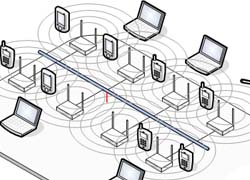

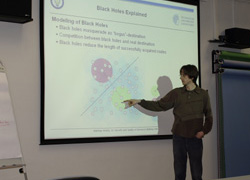


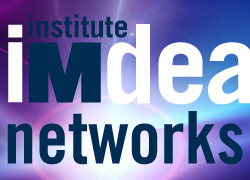
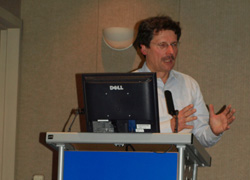

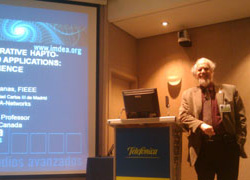

Comentarios recientes